38 costa levels of questioning worksheet
Level Three Questions require students to go beyond the concepts or principles they have learned and to use these in novel or hypothetical situations. TOPIC Level One (Complete, count, match, name, define, observe, recite, describe, list, identify, recall) Level Two (Analyze, categorize, explain, classify, compare, contrast, infer, organize, sequence) Level Three (Imagine, plan, evaluate, Level 1 Define: give the meaning of a word Describe: state detailed info. about an idea or concept Identify/Name: give the name of something, label specific information List: state a series of names, ideas, or events Recite: repeat or say from memory Explain: show you understand an idea, event, or concept "Reporter Questions": Who, What, When, Where,
Costa's Levels of Questioning. What do young children do when they want to know something? They ask A LOT of questions! Asking questions about things we don't know is another way we learn new information The higher the level of question, the higher the level of thinking and understanding you achieve. • In AVID, we will be developing ...

Costa levels of questioning worksheet
Overview of the Levels of Thinking: Level 1 - Readers can point to one correct answer right in the text. Level 2 - Readers infer answers from what the text implicitly states, finding answers in several places in the text. Level 3 - Readers think beyond what the text states. Answers are based on reader's prior knowledge/experience and Inquiry-based learning focuses on the student as learner, developing skillful, open-ended questioning skills. Being able to recognize different levels.6 pages Art Costa’s Three Levels of Questioning Introduction: Questioning and learning how to ask good questions are one of the central pieces in 21st Century learning . Questioning-based learning focuses on not only on the student as a learner, but also on the student as an investigator. Designed by Art Costa, the following information demonstrates ...
Costa levels of questioning worksheet. Understanding the three levels of questions, designed by Arthur Costa, is critical for student success. 1. Level One Questions are text explicit. 2. Level Two ...14 Jun 2015 · Uploaded by KC Summer Bridge Costa's Levels of Thinking and Questioning: to show LEVEL 1 What information is provided? What are you being asked to find? When did the event take place? Point to the List the Name the Where did Who was/were , Make a map of Page 6 of 11 Social Studies LEVEL 2 What would happen to you if Can you see other relationships that will help you find this Sep 28, 2021 - Explore Zijada Mustafic's board "Costas levels of questioning" on Pinterest. See more ideas about costas levels of questioning, teaching, avid strategies. Jun 22, 2019 - Explore Shannon Teeters's board "Costa's Levels of Questioning", followed by 182 people on Pinterest. See more ideas about costas levels of questioning, teaching, avid strategies.
This product is the text of Ray Bradbury's short story "All Summer in a Day," along with 18 questions broken down into the three levels of Costa's Levels of Questioning. First level questions are knowledge, text-based questions; second level questions are application-type questions; third level ques. Subjects: 1. Costa's Levels of Questioning and Thinking 2. LEVEL 1 - Book Only
- The answer can be found in the text (either directly or indirectly).
- Texts include books, lectures, or straight from the horse's mouth.
- This type of question is very concrete and pertains only to the text; it asks for facts about what has been heard or read. Level!1!(the!lowest!level)!requires!one!to!gather!information.! Level!2!(the!middle!level)requires!one!to!process!the!information.! Level!3!(the!highest!level)!requires!one!to!applythe!information.!! 3—Applying! Evaluate!Generalize!Imagine! Judge!PredictSpeculate! If/ThenHypothesizeForecast!! 2—Processing! Compare!Contrast!Classify! LEVEL II INTERPRETIVE QUESTIONS more than one answer with evidence from text more abstract, one must infer in order to answer examines causes and connections involves finding information that supports ideas Short answer or essay LEVEL II Making sense of the gathered information: Level II questions start with: analyze, compare, group, infer, contrast, sequence, illustrate, retell, synthesize, sort, diagram, summarize LEVEL II These questions require you to think a little harder.
April 16, 2010. I recently introduced Costa's Levels of Questioning to my students. We have some teachers at my school talking about these triggers of metacognition, so it compliments everyone's efforts to enter this discussion in the classroom. In a nutshell, Costa's questions are a more staccato version of Bloom's Taxonomy, making it more ... Costa's Level of Thinking & Questioning Posters (AVID) by. Megan Harmon. 33. $3.00. Zip. This includes 3 posters, one for each of Costa's Levels. Includes what students should be doing in each level (looking in book, comparing, using own knowledge) as well as Costa's keywords. Level 1 (the lowest level) requires one to gather information. Level 2 (the middle level) requires one to process the information. Level 3 (the highest level) requires one to apply the information. 3—Applying Evaluate Generalize Imagine Judge Predict Speculate If/Then Hypothesize Forecast 2—Processing Compare Contrast Classify Students need to be familiar with Costa's (and/or Bloom's) levels of questioning to assist them in formulating and identifying higher levels of questions.13 pages
This product is the text of Ray Bradbury's short story "All Summer in a Day," along with 18 questions broken down into the three levels of Costa's Levels of Questioning. First level questions are knowledge, text-based questions; second level questions are application-type questions; third level ques. Subjects:
Art Costa’s Three Levels of Questioning Introduction: Questioning and learning how to ask good questions are one of the central pieces in 21st Century learning . Questioning-based learning focuses on not only on the student as a learner, but also on the student as an investigator. Designed by Art Costa, the following information demonstrates ...
Inquiry-based learning focuses on the student as learner, developing skillful, open-ended questioning skills. Being able to recognize different levels.6 pages
Overview of the Levels of Thinking: Level 1 - Readers can point to one correct answer right in the text. Level 2 - Readers infer answers from what the text implicitly states, finding answers in several places in the text. Level 3 - Readers think beyond what the text states. Answers are based on reader's prior knowledge/experience and




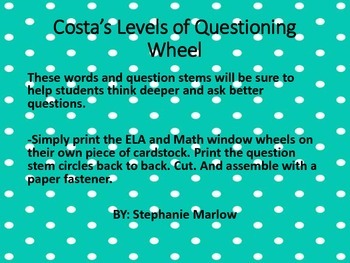
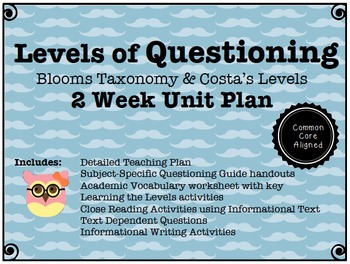

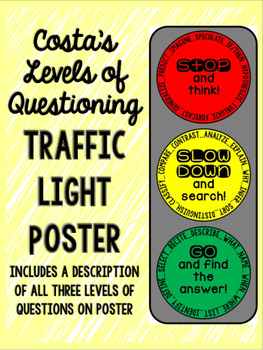
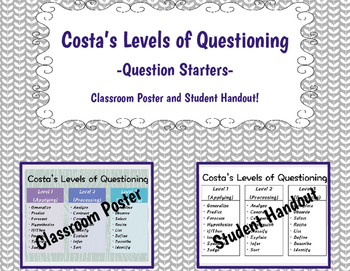
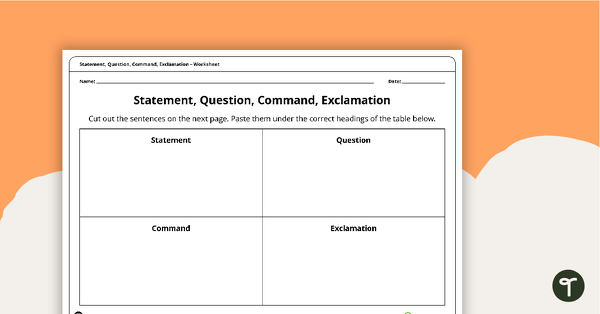

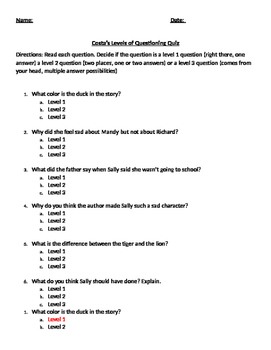




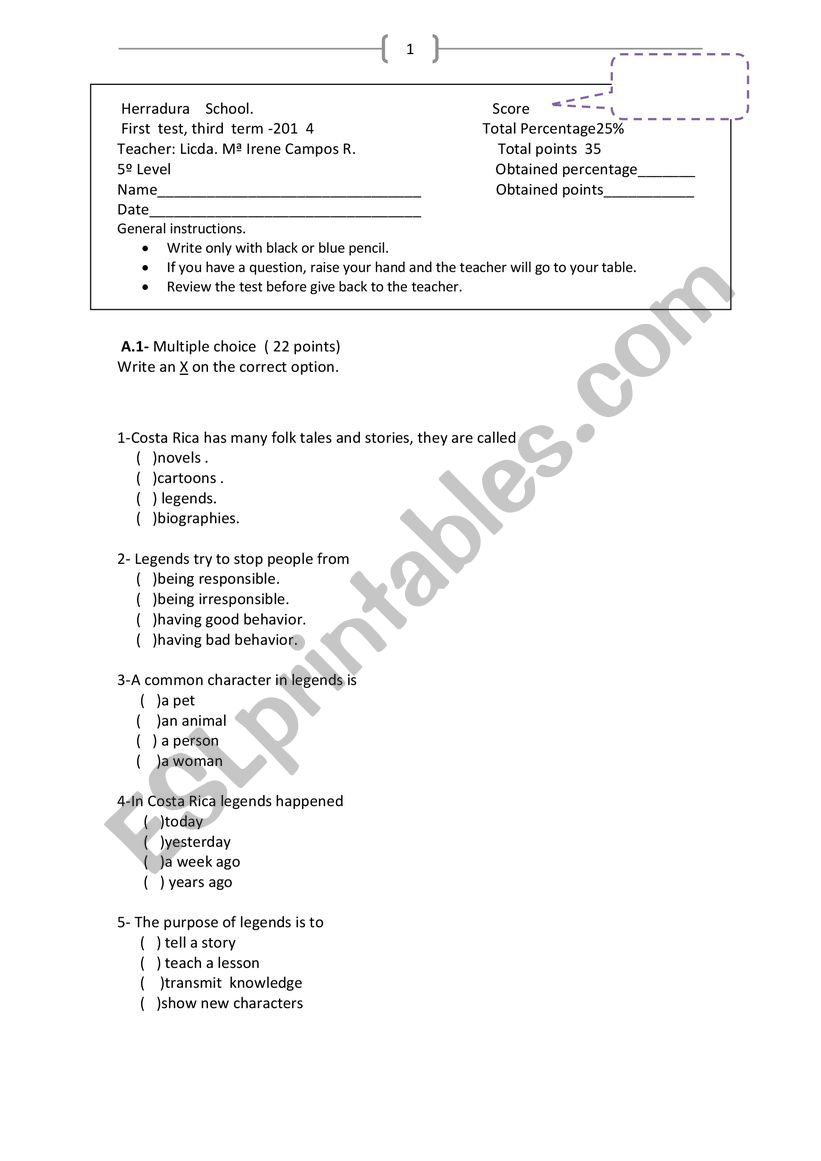




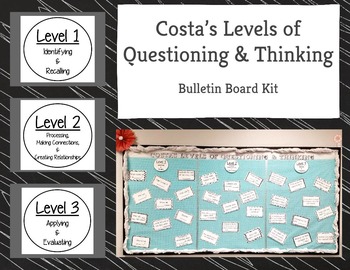





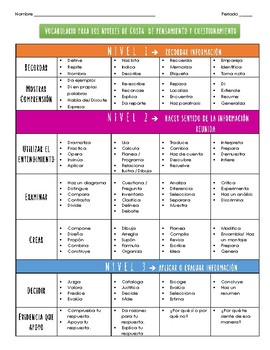
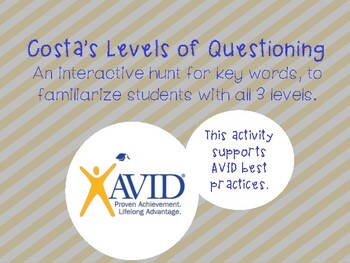


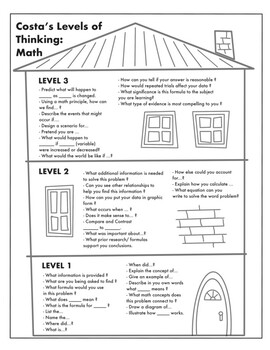
0 Response to "38 costa levels of questioning worksheet"
Post a Comment